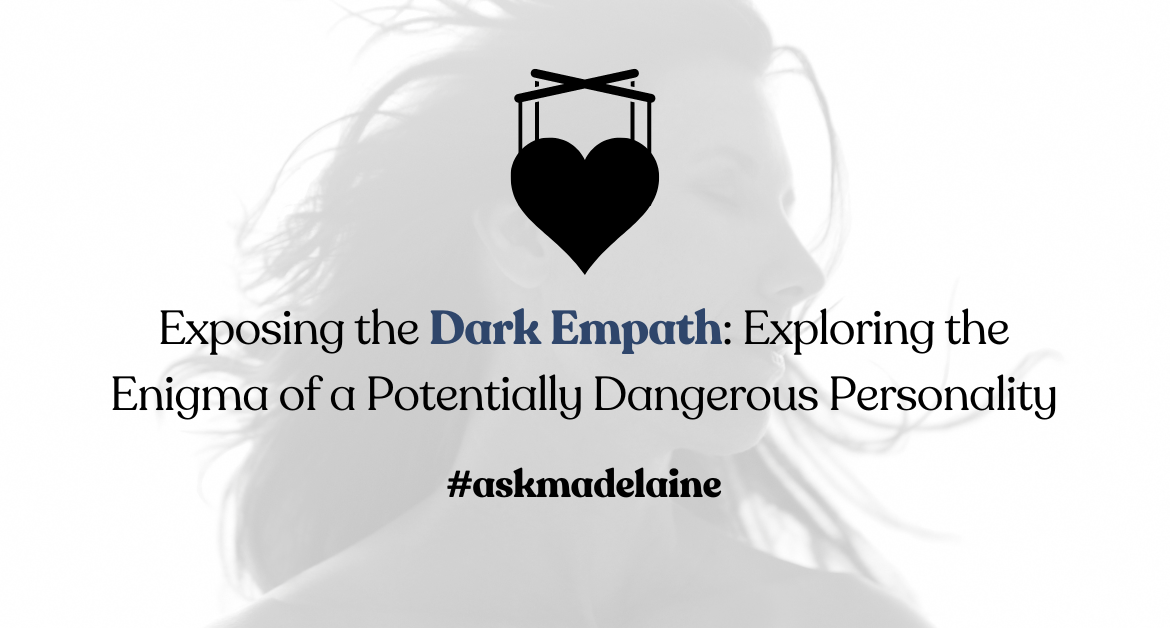

Exposing the Dark Empath: Exploring the Enigma of a Potentially Dangerous Personality
Ever wondered if the dark empath could be lurking in the shadows of your everyday life, quietly weaving their intricate webs of influence? Join me as we venture into the depths of this intriguing personality type, unraveling the mystery of who they are, what traits define them, and where they might hide in plain sight.
So, who exactly is the dark empath?
Picture this: nestled within the spectrum of narcissistic personalities, the dark empath stands out. Unlike the conventional image of a cold and distant narcissist, they possess an uncanny ability to understand and anticipate emotions—a trait known as cognitive empathy. It’s like they have a sixth sense for deciphering the feelings of others, navigating social waters with a precision that’s both impressive and unsettling.
Traits if the dark empath:
Let’s delve into their traits, shall we?
First up, their charm. Dark empaths have a way of drawing people in with their magnetic personalities. It’s a charm that’s disarming, making it easy for them to gain trust and forge connections. But here’s the kicker: behind that charming facade lies a keen manipulator. Their cognitive empathy isn’t just about understanding emotions; it’s about using that understanding to serve their own agenda. Think of it as a superpower they wield with finesse, selectively doling out empathy to suit their needs.
And where might you find them lurking?
Well, that’s the tricky part. Dark empaths are masters of disguise, blending seamlessly into various environments. From professional settings where their manipulative skills can help them climb the corporate ladder, to personal relationships where they craft the illusion of deep emotional connection, they’re everywhere. Yes, even in the seemingly pure realm of holistic wellness and spiritual practices, their deceptive charisma can find a foothold.
Help! I think I know a dark empath! What do I do?
So, you suspect you might be dealing with a dark empath. Don’t panic. Here are some steps you can take to navigate the situation:
1. Trust your instincts: If something feels off in your interactions with someone, don’t ignore it. Your gut instinct is often a reliable indicator of underlying dynamics.
2. Look for patterns: Take a step back and analyze the individual’s behavior over time. Do you notice a pattern of manipulation, charm, and selective empathy? Pay attention to inconsistencies between their words and actions.
3. Set boundaries: Establish clear boundaries in your interactions with this person. Be assertive about what you will and won’t tolerate, and don’t hesitate to enforce those boundaries if they’re crossed.
4. Seek support: Confide in a trusted friend, family member, or therapist about your concerns. Having a sounding board can provide perspective and validation.
5. Limit exposure: If possible, minimise your interactions with the individual. This doesn’t necessarily mean cutting them off completely, but rather maintaining a healthy distance to protect yourself.
6. Practice self-care: Focus on self-care and prioritizing your well-being. Engage in activities that bring you joy, relaxation, and fulfilment to counteract any stress or negativity from the situation.
7. Seek professional help if needed: If you’re struggling to cope with the situation or feel overwhelmed, consider seeking support from a mental health professional. They can offer guidance and strategies for dealing with difficult interpersonal dynamics.
Remember, it’s essential to prioritise your own mental and emotional health when dealing with potentially toxic individuals. Trust yourself, set boundaries, and seek support as needed to navigate the complexities of interactions with dark empaths.
In conclusion, navigating the shadows cast by dark empaths requires a blend of vigilance, self-awareness, and a keen understanding of their traits. They may be elusive, but with the right tools, we can protect ourselves from their potential dangers. Stay tuned for the next installment, where we’ll explore strategies for recognising and safeguarding against these enigmatic individuals across various facets of life.
Protecting ourselves from the dark empath starts with awareness. What small step can you commit to today to safeguard your well-being and ensure your emotional resilience in the face of potential manipulation?
🌿 I Frid, Madelaine

